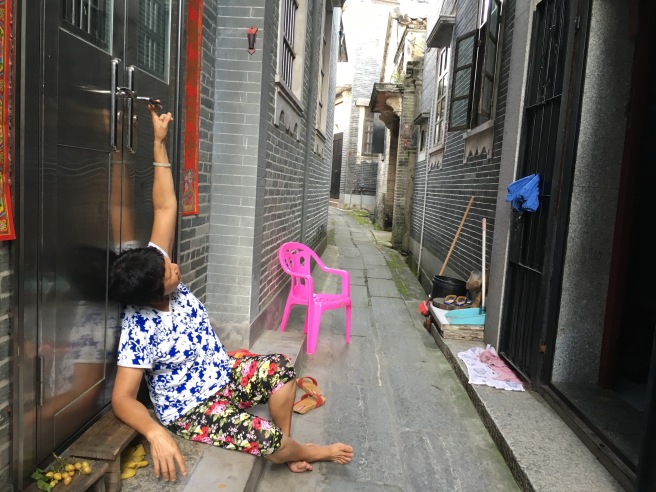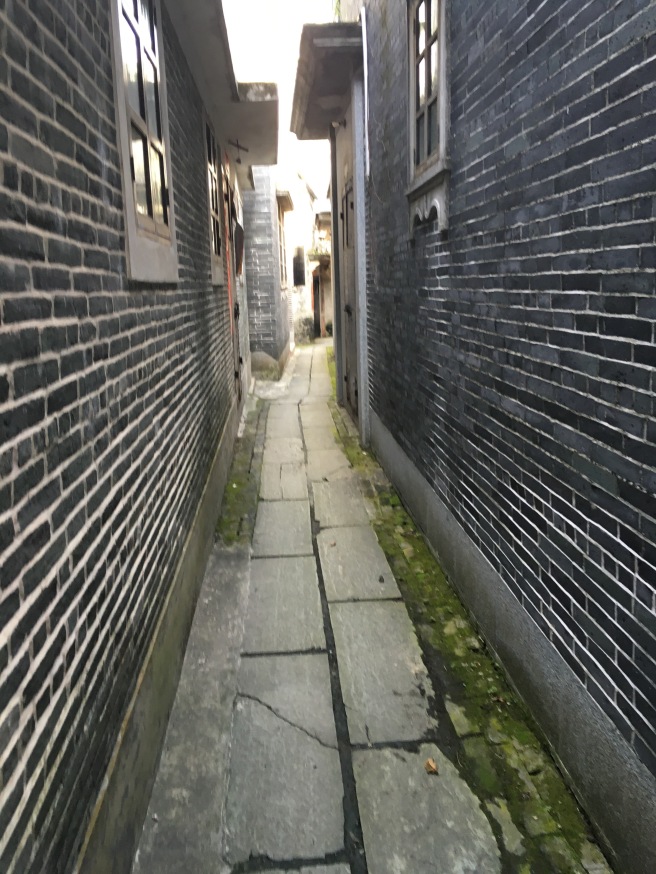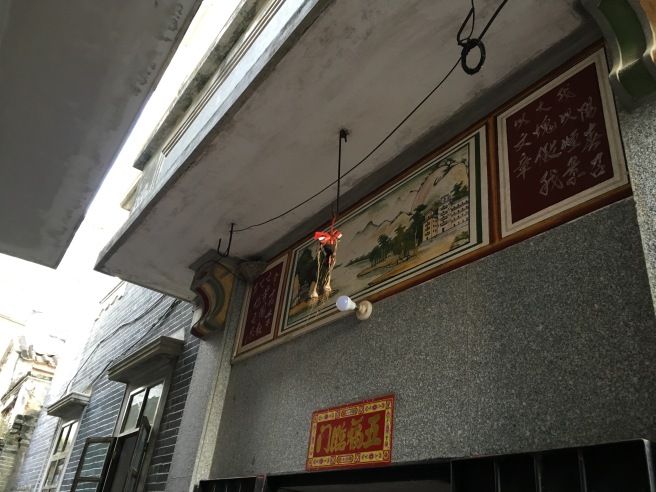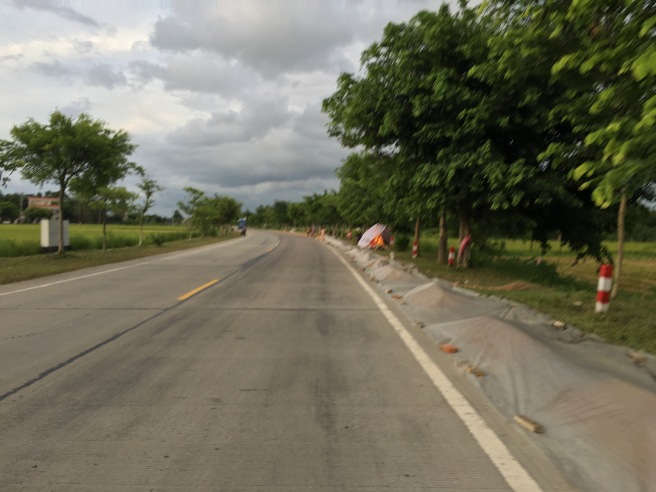The Kaiping Diaolou conservation people did a good amount of work on the village of Sanmenli. They paved the walkways prettily, they redid walls with qing bricks, and they painted ceramic wet paintings over peoples’ entrances.
When I was walking back out through narrow Venice-like alleyways, I came across the granny selling dried fruit again! Along with the good people who had directed me to Yinglonglou earlier. They lived near each other, or they were relatives, I’m not sure. The granny said, “Oh! Look! It’s the girl from America!”
There was a woman lying on her side barefoot on some steps, resting her elbow and head on a wooden stool and eating wampees. She looked really comfortable despite how hard the ground looked. Another uncle sat on a bright pink plastic chair.
The woman eating wampees had laughed, “If you’re from America, what the hell are you doing suffering your way back here?”
I had retorted, “Of course I have to come back! If I don’t know where I came from, how am I supposed to live?”
I had wanted to keep on going, but the woman with the wampees smiled and invited me to sit down and chat. She shared some wampees, and I took one. The granny told them about how I turned down her free dried fruit. I threw away the wampee skin and seeds and they invited me to wash my hands with their faucet on seeing how much I was scratching a bug bite on my arm. They had removed the top turn-y part of the faucet and they’d hung it on their door like a key to running water. I dried my hands on my shirt though they invited me to use their towel. I had to reapply on my mosquito bites some of the Zhengjinyou (正金油) ointment that Grandpa Deng took me to buy a couple days ago.
The woman with the wampees smiled a lot and said, “Come on, let’s chat!” The uncle got up and revealed that he sat on two pink plastic chairs, and he gave me one. He parked my bike about a meter or two away from me, but I sat with my back to the wall so that I could keep half an eye on my basket of stuff, which included my phone and money.
The granny had said, “The people around here are good. Don’t worry about people stealing stuff.”
I think maybe two years ago I might have trusted everyone completely. But now I think not trusting everyone completely all the time is okay. It’s not that you think that everyone is bad, and that your heart is pessimistic. Sometimes you just can’t afford to keep letting your life completely be up to the winds of nature. Maybe nobody would have stolen my stuff, but maybe my bike would have started rolling down the alleyway and straight into the fish pond! Who knows. Literally anything can happen. You are always better off being safe than sorry.
The villagers had talked to me for a good while. They asked me about where my parents’ villages are, about America, about my family, about my college tuition, and how I’m paying for everything. I was honest about everything. They asked me why I came back alone, and I was honest about that, as well. My family hasn’t been back to Kaiping yet because we haven’t been able to afford to! Coming back to Kaiping from overseas means on top of purchasing everyone’s airplane tickets, you will also hold a big dinner banquet in your village and pay for a lot of fancy souvenirs to show everyone your fortune and generosity. And since we haven’t “made it” yet, my mom didn’t want to go back and set us back several years just to prove a point to everyone that she is doing well. That it was all worth it.
“Is it nice in America?”
I can’t remember exactly what I said, but I do remember saying that it’s a lot easier to make money in America than it is here. And inside I kept thinking about the weather and mosquitos. If people left Guangdong for money, they stayed away from Guangdong because of the weather and mosquitos. At least that’s what my mom tells everybody else.
“Around here, we’re just whatever…” The woman with wampees smiled, gesturing to her alleyway. She was always really smiley, and she talked really slowly, much slower than anyone I’ve met from the countryside. Everyone else who speaks the Kaiping dialect speaks fast and with a lot of emotion. I used to think it was crude and unattractive, but for some reason I don’t think so anymore. I wish I could speak the Kaiping dialect fluently like Professor Tan or at least confident version of the Kaiping dialect like Nana. The woman with wampees spoke to me mostly in a Cantonese with a Kaiping accent. Usually, when you speak to a villager in Cantonese, they respond with Cantonese instead of the Kaiping dialect.
“Why are you here by yourself? You should have come with your boyfriend,” the woman with wampees remarked.
The granny responded, “That’s what I said!”
Around here people are really surprised that you go places by yourself if you’re a young woman. Meanwhile, back in the states, I know girls who climb mountains by themselves.
“What’s the use of having a boyfriend… I’m always flying here and there. Even if I do date, it never lasts.”
They laughed. It was really refreshing to hear that. The granny said, “Ah well. It’s good to date a few boys in your life, anyways.”
The woman with wampees smiled and said, “When I was your age, I was married with a kid.”
They had introduced themselves as the Guan (關) family. “The Guan as in closing doors, guan men (關門 [traditional] / 关门 [simplified]).”
“Wait, Guan? Like the Guan family at Chikan, with the Guan and Situ rivalry?”
“Yes, that Guan. Around here, we’re all Guan. If you go to the south-side, it’s the Situ territory.”
I took the chance to ask about how it was when the Kaiping Diaolou conservation people came to work on their village. She said, “Eh, I mean, they gave us an offer that was good for both of us, so we accepted. They redid the walkways in our alleys, so that it’s really nice to walk on… they redid our electrical units and our water pipes so that everything’s hidden away and nice-looking. They redid our walls so that it looks really nice now. And they painted that stuff above our doors.”
I noticed a bird’s nest on the left corner of the painting. Just then, a bird fluttered in and baby birds burst in a choir of chirping for attention. The bird fed them and flew away.
“Oh! A bird’s nest!”
“Yeah… they’re yuan yang (鸳鸯).” I think that the woman with wampees might have been using yuan yang figuratively, because the birds in the nest were black and slim and looked nothing like the colourful ducks that I found on google images. She referred to them as yuan yang because there was a couple. After the first bird flew away, another bird that looked the same flew back in and the baby birds chirped enthusiastically for more food.
“It must be good luck!” I had said.
“What kind of good luck…?” The woman asked.
“Oh, I don’t know. It just feels benevolent.” I was embarrassed. I was just saying things. I actually know nothing about Chinese feng shui.
“I put a towel below their nest…” She gestured to a towel on the ground. “They poop a lot…”
“Oh…”
“I actually don’t really like them there… I have gotten rid of their nest a couple of times already. But they just come back. So I stopped trying…”
I eventually had to leave. The uncle invited me to eat dinner with them, but I said dinner was waiting for me back at Tangkou. They gave me extensive direction guiding on my way home.
“Just follow the highway. After about 8 km, you will get to a stoplight. Turn right and keep going until you see a pavilion that says Tangkou.”
They really knew this whole area very well! I set off.

The road back was long. I was so tired. But I had a lot of things to think about on the way back. Like, how the heck is Matthew Goss doing his whole fellowship thing by bike? Well, he’s used to it, I guess. I still have to build up some more leg muscles.
The weather is terrible this week for the farmers drying their grains. I saw some farmers still trying to save their grains for a sunnier day. They cover their grains when it rains, and then they uncover it as soon as the rain stops so that the grains don’t 0verheat, which would cause them to start “teething” aka sprouting! They’re seeds, after all.
In French, this frustrating weather pattern is called “les giboulets,” where it’s sunny and warm while rain falls at short but strong spurts all day long.
Grandpa Deng said that when the grains can’t dry, the farmers can’t sell them at full price. Grain that is not completely dry is worthless and only suitable for feeding ducks and chickens.
The Liyuan parking lot was empty. The northern farmers had taken in all their grains.



